Tuesday, October 31, 2006
Blair's Opposition to Inquiry Designed to Extend his Time as PM?
 I've not been able to watch the debate on whether there should be an inquiry into the reasons for going to war in Iraq-inexplicable problems with my cable telly- but have listened to the reports as it has been going on. By all accounts it is a debate 'ferocious' in tone; even after three years the decision is able to generate intense passions. Labour complain the Conservatives, in backing the call for an inquiry are being 'opportunistic'. And I'd say there is a logical reason to investigate the causes even if you agreed with it. But, as experienced politicians, what do they expect?
I've not been able to watch the debate on whether there should be an inquiry into the reasons for going to war in Iraq-inexplicable problems with my cable telly- but have listened to the reports as it has been going on. By all accounts it is a debate 'ferocious' in tone; even after three years the decision is able to generate intense passions. Labour complain the Conservatives, in backing the call for an inquiry are being 'opportunistic'. And I'd say there is a logical reason to investigate the causes even if you agreed with it. But, as experienced politicians, what do they expect?Margaret Beckett was not convincing either. To argue that (what she dismissively referred to as) 'rehashing' such matters is bad for troop morale is scarcely persuasive. If I were in Iraq a soldier I think I'd be quite glad to be enlightened on precisely why I was out there. Beckett seemed to suggest that once the troops were back home then that would be the time to do the inquiry- and to be fair that is when the excellent Franks Report on the Falklands was produced. But when pressed by Kenneth Clarke on this this she veered away as if startled at her own idea.
As for the politics of it, I note firstly that Hilary Benn will sum up for the government. This will give some prominent exposure after announcing his candidature for the deputy leadership but, given the topic, it won't do him much good with Labour lefties- his natural constituency- to be seen defending Blair. Secondly, why is Blair so against the idea? It could be argued that: as Iraq has already done its worst to him, destroying his repuation for veracity and much of the trust we all had in him; and as he is going anyway, he might as well allow this inquiry to be set up. My suspicion is however that the explanation goes something as follows. Before the Manchester conference, it seemed he'd be lucky to survive a week let alone till next May; but after his magnificent speech he seemed to have won a respite and maybe June-July might now seem acceptable rather than the earlier date.
It might sound fanciful but it could be that to be sure of these precious extra months of political life, Blair is pursuing a strategy of maximizing his support in the party. He wants to sustain the recovery in his fortunes which the September conference achieved by protecting himself from a process which would direct unwelcome attentions to a period of policy planning about which he feels (I suspect justifiably)insecure.
Prior calculations suggest sufficient number of antiwar Labour MPs will fit in with Blair's putative strategy and enabvle him to squeak through, but he should be assured by the tone of this debate that this issue will dog him all the way to his grave.
Monday, October 30, 2006
Stern Sceptic Gang fail to see other reasons for changing our lifestyles

 The Guardian today runs an article on the groundbreaking Stern Report(Sir Nicholas, chief government economist, is pictured right) which details the attacks already being made upon it by rightwing sceptics who say, like Lord (Nigel) Lawson, that it 'can lead to no useful outcome'. It is truly beyond belief that there remain people unconvinced by the mountainous evidence arguing in favour of a causal link between global warming- which no-one denies- and the annual gouting of 33,000 million tons of carbon emissions resulting from humankind's economic and other activities.
The Guardian today runs an article on the groundbreaking Stern Report(Sir Nicholas, chief government economist, is pictured right) which details the attacks already being made upon it by rightwing sceptics who say, like Lord (Nigel) Lawson, that it 'can lead to no useful outcome'. It is truly beyond belief that there remain people unconvinced by the mountainous evidence arguing in favour of a causal link between global warming- which no-one denies- and the annual gouting of 33,000 million tons of carbon emissions resulting from humankind's economic and other activities.I happen to agree with Will Hutton that, at last Stern has charted a coherent way out of the impasse we face with only a decade to go before it becomes too late. I hope he is right that the 'tipping point' in world attitudes is currently taking place. Stern's idea of employing market mechanisms is especially subtle and appealing. The former head of the World Bank suggests the embryonic carbon trading system pioneered in Europe should be extended worldwide so that virtuously green carbon cutting countries can sell their quotas to those less virtuous with the result that the former prosper and the latter do less so. As Hutton expresses it:
If it becomes clear that the risk of climate change is overtstated, the price of carbon will sink, but if it is as bad as some fear, the price will rocket. Markets will signal the risks.'
Sceptics seem so determined to be thick they would probably find reasons to deny the other major reason for cutting emissions and generally reining back economic activity. Back in 2002 the World Wildlife Fund (WWF) produced a report detailing the excessively high consumption of raw materials from the earth caused by the voracious appetites of modern day living. The report warned that the human race is plundering the planet at a pace that outstrips its capacity to support life.
In a damning condemnation of Western society's high consumption levels, it adds that the extra planets (the equivalent size of Earth) will be required by the year 2050 as existing resources are exhausted.
Naturally, western countries consume more and deal out more damage to the environment than developing nations:
America's consumption 'footprint' is 12.2 hectares per head of population compared to the UK's 6.29ha while Western Europe as a whole stands at 6.28ha. In Ethiopia the figure is 2ha, falling to just half a hectare for Burundi, the country that consumes least resources.
I also agree with jackie Ashley that this report will do Gordon Brown some good as the putative incoming PM. His ability to absorb Stern's 700 pages-remember it's his report- will give him the edge over Cameron and Campbell in debate and its reliance on US cooperation will provide him with a moral mission abroad which will help broaden his appeal when re-election comes around.
Sunday, October 29, 2006
On Hubris, Political Leadership and the 'Messiah' Complex
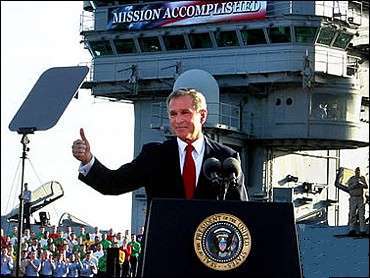 Our esteemed former Foreign Secretary Lord (David) Owen, will shortly publish a book on health aspects of political leadership, revealing that Anthony Eden, for example, ran a temperature of 106 degrees at the height of the Suez crisis. But today he writes an interesting article in the Observer in which he discusses the dangers of 'hubris.. in heads of government'; more precisely he warns:
Our esteemed former Foreign Secretary Lord (David) Owen, will shortly publish a book on health aspects of political leadership, revealing that Anthony Eden, for example, ran a temperature of 106 degrees at the height of the Suez crisis. But today he writes an interesting article in the Observer in which he discusses the dangers of 'hubris.. in heads of government'; more precisely he warns:'The intoxication of power in heads of government can be as great a menace to the quality of their leadership as are conventional illnesses.'
Having posted on Richard D. North's Mr Blair's Messiah Politics only a couple of days ago I picked up on this comment from someone most critics accuse of the very thing, about which -wearing his doctorly hat we all thought he'd forgotten how put on- he warns us now. He also warns of the tendency for such hubris to invoke on its side the support of He who allegedly resides above; as Blair said on his decision to go into Iraq:
If you have faith about these things, then you realise that judgement is made by other people. If you believe in God, it's made by God as well.'
Owen's argument is that both leaders allowed that 'intoxication of power' to blind them to the dangers of their chosen course of action and to those necessary and particular details on which success or failure in such risky enterprise depend. I'm no a medical expert, of course, but I happen to think that a more persuasive explanation of the Bush-Blair reaction to 9-11 was not hubris but good old fashioned shock and fear. I think they were paralysed by the horrific, demonic brilliance of bin Laden's airborne torpedoes and struck out blindly, reacting with irrational lack of care; hence the ill-advised, lemming-like invasion of Iraq. But here's an odd irony. On rereading North's book on Blair's 'Messiah complex', I note that this hoary old rightwing journo concludes with:
'It is worth restating that without all Mr Blair's nonsense and worse, we would not have deployed in Iraq...future generations may yet say this action alone made Tony Blair a great leader. What's more, they may even judge that all the damage he did was nothing compared to this great good'
I don't have the power of foresight but somehow I feel that on this aspect of Blair at least, Dr Owen will prove a more reliable authority.
Saturday, October 28, 2006
Benn the Younger Might Succeed where his Dad Failed

 We learn today that Hilary Benn, Secretary of State for International Development, has openly entered the race for Labour's Deputy Leadership election, whenever that event might take place. Along with Peter Hain, he is the second Cabinet member to announce his candidature, though Jack Straw and Alan Johnson have both indicated their probably similar intents. Harriet Harman, the constitutional affairs minister, and John Cruddas, MP for Dagenham are the other two declared runners.
We learn today that Hilary Benn, Secretary of State for International Development, has openly entered the race for Labour's Deputy Leadership election, whenever that event might take place. Along with Peter Hain, he is the second Cabinet member to announce his candidature, though Jack Straw and Alan Johnson have both indicated their probably similar intents. Harriet Harman, the constitutional affairs minister, and John Cruddas, MP for Dagenham are the other two declared runners. Picking the winner from this far out is impossible but, as they stroll around the paddock, the runners can be weighed up. Straw has gained a high recent profile from raising the veil issue- though whether this will count for or against him in the end is a moot point; I'd say it was fractionally negative at the moment. Harman is the only woman so far in the frame and this will help her, but she lacks name recognition and has never really recovered from her sacking in 1998, accompanied by her junior minister, Frank Field. Johnson is a real prospect for the job and, indeed, may well run for the leadership itself next Easter or whenever the contest is held to replace Blair. But he suffered some reversals as the 'top outsider' at the Manchester conference and needs to raise his profile.
John Cruddas, on the other hand, has arguably become the 'top outsider' for the deputy's job; the man whom, according to Paul Linford the unions and party members want to counter Establishment figures like Straw and Hain. He is also known, according to Paul, somewhat mystifyingly as 'The Blogger's Candidate'. There are several furlongs to run yet but he seems well placed.
So what,then, of Benn junior? I would say also well placed, having in his favour, the following advantages:
a) He is perceived as a competent minister- sad to say, a somewhat rare qualification in Blair governments. Moreover his department is seen as 'morally sound'- doing good socialistic things for needy people. Labour members like that.
b) He has a wide cross party appeal, and, according to an aide, 'will be able to rebuild the coalition that was so critical in 1997'.
c) Evidence of b) above is provided by the support of Dennis Skinner for the fresh faced Been junior; the 'Beast of Bolsover' carries clout as probably the best known representative of the Old Labour tendency in the party.
d) Ian McCartney, the diminutive trade minister and former party chairman - himself a formidable organizer and Labour fixer- is standing by to offer support.
e) Finally, Tony Benn was arguably a disruptive influence in the early eighties who helped prolong Labour's years in the wilderness. But this is not how all members see it and Benn's longevity as an unreconstructed socialist rebel has made him, paradoxically, into a species of National Treasure. His determined campaigns and scrupulous politeness won him respect from all over the House, even including the Conservative benches('we love his manners' Julian Critchley once told me). The now revered position of Hilary's once troublesome father will certainly be an assist in his bid to succeed where Dad failed, by just one per cent, way back in 1981.
Friday, October 27, 2006
Blair as 'Messiah' Maybe Solves the Riddle?
 I'm often a bit slow getting round to reading books for review but having finally read, Richard D. North's Mr Blair's Messiah Politics, I think he may have got as close as anyone to identifying the wellsprings of this mercurial, super-abundantly gifted politician. North is a hoary old ubiquitous rightwinger who has been banging on about capitalism's virtues it seems, since for ever(a recent book, for example is subtitled a 'very personal defence of mass affluence'); so I was not tempermentally inclined, from the outset, to favour his viewpoint. There is much unexceptional banging on, of course, but his thesis, I have to accept, fits the facts and has some persuasive power.
I'm often a bit slow getting round to reading books for review but having finally read, Richard D. North's Mr Blair's Messiah Politics, I think he may have got as close as anyone to identifying the wellsprings of this mercurial, super-abundantly gifted politician. North is a hoary old ubiquitous rightwinger who has been banging on about capitalism's virtues it seems, since for ever(a recent book, for example is subtitled a 'very personal defence of mass affluence'); so I was not tempermentally inclined, from the outset, to favour his viewpoint. There is much unexceptional banging on, of course, but his thesis, I have to accept, fits the facts and has some persuasive power. He defines the riddle of Blair as someone who is a 'vacuous' enigma, yet, unlike most falling into this category, who also has an inner 'steeliness'. North's explanation is that Blair sees himself as some kind of 'Messiah', possibly sent by God, and, as Bush has said of himself, 'put here for a purpose'. Because he was without the sharp ideological edge of, for example, a firm belief in socialism, he was able to present voters with a vessel they could fill to an extent, with their own ideas and goals.
'He persuaded Britons they had been subjugated by a bad old culture, and he represented the New Man who could free them.... Tony Blair was charismatic in just the right way for his time. For a while at least, he personally, as an individual, embodied an aspiration.'
Blair was an example of the 'ideal leadership type... in the mould of the charismatic German romantic, the hero spellbound by his own charm who places himself above party.' Not for him the mere mundanities of domestic politics; the world was his proper stage: solving the problems of Africa, saving the oppressed, feeding the starving, overcoming the wicked. This helps to explain the 'steeliness': people on such higher missions expect to be misunderstood, to be criticised, to become a martyr even:
'He does not expect us to like him or reward him, now or in the future.'
North discerns early stage messianism in Blair's fascination with rock music, his conversion to devout Christianity at Oxford and his sermonising tendencies, so deftly satirised in Private Eye'sThe Vicar of St Albion. One might also attribute to his Messiah comlex Blair's determination to adhere fast, like a limpet, to the politically unwholesome George Bush. Blair must have realised that his ambitions to become the conduit for such planetary portions of good, he could not just be the leader of a middle ranking former colonial power: however unpalatable it might prove to be, he had to be able to access the power of the world's only super-power. Persuasive? I think so.
Thursday, October 26, 2006
Mountbatten Mismanagement Provides Iraq Warnings
 I've always been a bit wary of rightwing historians like David Starkey et.al. but the comprehensive dismantling of Lord Mountbatten's reputation- both as a military man and politician- by Andrew Roberts in his Eminent Churchillians is, by any standards, a cracker. Roberts' account tells us how the highly ambitious 'Dickie' Mountbatten, utilizing his royal connections to the full, was promoted from wrecking ships under his command to wrecking wartime operations like the suicidial Dieppe Raid and finally, once his incompetence had been fully established, wrecking really important things like the transition of India and Pakistan to independence in 1947.
I've always been a bit wary of rightwing historians like David Starkey et.al. but the comprehensive dismantling of Lord Mountbatten's reputation- both as a military man and politician- by Andrew Roberts in his Eminent Churchillians is, by any standards, a cracker. Roberts' account tells us how the highly ambitious 'Dickie' Mountbatten, utilizing his royal connections to the full, was promoted from wrecking ships under his command to wrecking wartime operations like the suicidial Dieppe Raid and finally, once his incompetence had been fully established, wrecking really important things like the transition of India and Pakistan to independence in 1947. It is in this last, wholly misplaced capacity, that his much self hyped career offers us some signal warnings. As soon as he was appointed Mountbatten, always hyper actively 'dynamic', set a ridiculously early withdrawal date, refused to listen to warnings regarding potential trouble, provided manifestly inadequate military forces to deal with any trouble; and refused to use what force he had when it was desperately needed. On 15th August 1947 independence was granted to India and Pakistan whereupon a transfer of population occurred of some 14.5 million as those now belonging to minority religions sought to move into their newly defined majority areas. 7.5 m Muslims moved to Pakistan from India while 7.2 m Hindus and Sikhs, mostly in the Punjab, moved the other way. Hostility between the religious groups had been brewing for decades and the vulnerable refugees became victims as the predicted conflict exploded. Figures are inevitably disputed but between a quarter of a million and a million people were slaughtered in the most apalling fashion.
The Iraq parallel should be obvious. We know the hatred between Sunnis and Shias has festered and bubbled for decades; they have divided and are are still dividing in Iraq into viciously warring urban militias; and occupying forces are threatening to withdraw with a speed whipped on by growing political panic. The history of Iraq since 2003 has been grim; the prognosis is more of the same though worse. But the presence of Iran, Saudi Arabia and others close by with related religious sympathies adds a regional dimension which potentially dwarfs anything which has happened in the Middle East to date. We are fed up at our troops being killed and repelled by this unnecessary war, but repeating the mistakes of the subcontinent sixty years ago, risks a similar bloodbath or worse. Neither Blair nor Bush-both no slouches at self hype either- would relish legacies as tarnished and disputed as Mountbatten's has turned out to be in the light of history.
Tuesday, October 24, 2006
Don't ask Maliki to do the Impossible
 The poll reported in The Guardian today reveals that 61 per cent of our citizens want troops out by the end of the year. Kim Howells, Foreign Office minister thinks the same and so do a galere of American pundits and politicos. We learn that Bush has even told the Iraqi prime minister that he has to overcome the militias or face 'penalties'.
The poll reported in The Guardian today reveals that 61 per cent of our citizens want troops out by the end of the year. Kim Howells, Foreign Office minister thinks the same and so do a galere of American pundits and politicos. We learn that Bush has even told the Iraqi prime minister that he has to overcome the militias or face 'penalties'.This last seems to me to be the most asinine and unfair switch of policy we've had so far. Having led us into the quagmire, US-UK have decided the going has got too sticky and so want to exit sharpish, the imminent mid-term elections having concentrated Republican minds rather wonderfully on this point. But what if getting out of the quagmire actually makes it worse(as Mountbatten's precipitate exit from the partitioned subcontinent did in 1947)? What if the dogs of civil war are really let loose by such a move? Well, the answer is, clearly, to blame the Iraqi government. After all, the Coalition invaded and lost lives in fixing it up so now it has to earn its corn by sorting out its own security problems. Fair enough? I don't think so.
Lets be clear that it's events caused by the invasion which have created the current abysmal security situation. Throwing responsibility for sorting out the mess to a fledgling, unstable, democratic government is imposing an impossible task on what many people-not just John Pilger- insist is merely a 'puppet' government. If 140,000 highly trained and well equipped troops belonging to the world's greatest military power cannot quell the fighting, then how on earth can Maliki's army and police-infiltrated and riven in any case by those same murderous militias- manage to succeed? It's like an athletics coach breaking the legs of his untrained sprinter and then telling him he has to break the world record. It is madness upon madness, driven by the political imperatives of the western democracies which wilfully stumbled into this disastrous mess in the first place.
Monday, October 23, 2006
Civilian Deaths in Iraq
 The death toll in Iraq is reaching daily horrendous figures. American troops have suffered some 3000 deaths with the average daily body count rising from 30-40 in 2003 to 50-60 in 2006. British troop fatalities have recently exceeded 120 but both these figures are dwarfed by the death toll among Iraqi civilians. There is, perhaps natural a tendency for us non-combatants to care less for Iraqi deaths than for those of our troops whilst also, quite rightly, feeling guilty at our own double standards; after all, we all know that a mother who loses a son greives and suffers just as much whether she be Iraqi or British. US-UK forces originally invaded Iraq to do good: to find and eliminate WMD we were told; or to expell the evil Saddam Hussein whose bloody reign had caused mass Iraqi deaths. We all know WMD haven't yet turned up but has the invasion really lifted the Ba-athist yoke of suffering from Iraqis? It seems unlikely.
The death toll in Iraq is reaching daily horrendous figures. American troops have suffered some 3000 deaths with the average daily body count rising from 30-40 in 2003 to 50-60 in 2006. British troop fatalities have recently exceeded 120 but both these figures are dwarfed by the death toll among Iraqi civilians. There is, perhaps natural a tendency for us non-combatants to care less for Iraqi deaths than for those of our troops whilst also, quite rightly, feeling guilty at our own double standards; after all, we all know that a mother who loses a son greives and suffers just as much whether she be Iraqi or British. US-UK forces originally invaded Iraq to do good: to find and eliminate WMD we were told; or to expell the evil Saddam Hussein whose bloody reign had caused mass Iraqi deaths. We all know WMD haven't yet turned up but has the invasion really lifted the Ba-athist yoke of suffering from Iraqis? It seems unlikely.Most people living in Baghdad face shortages of food, electricity and the kind of services we take for granted. On top of that they face threats to life and limb from a hydra headed insurgency entailing: sunni militias v shia militias, nationalists v western occupiers, shia groups v rival shia groups and jihadis v nonjihadis. No doubt there are also various shades of criminal groups seeking to exploit the chaos as well. Even hairdressers have been threatened with death as shaving off beards-as hairdressers occasionally do- is held by extremists to be a violation of the spirit of Islam. Recently a group of researchers from Johns Hopkins University in a Lancet article calculated some 655,000 extra civilian deaths had been caused by the war had occurred. This contrasts with official US government figures of 30-60,000 deaths. The figure has been much criticised, not least by commenters on an earlier post(8th October) of mine. But maybe, despite justified doubts, the topic deserves a little more attention.
Gavyn Davies, former adviser to Number 10 and senior economic guru to Goldman Sachs as well as Chairman of the BBC applied some analysis to the question in his occasional Guardian column recently. He notes that the researchers' figure for deaths during Saddam's time was 5.5 deaths per 1000 people while since the war the Lancet article places it at 13.3 per 1000. Wildly wide of the mark? Rubbish methodology? Davies agrees it can be criticised but mainly, it would seem, because the pre invasion figures might easily have been higher i.e. people interviewed might easily have 'forgotten about deaths which happened a few years previously'. Seems to me, though, deaths are not the sort of thing one tends to forget all that easily. Even if exaggerated to some degree, the study suggests the situation in Iraq is much, much worse than we have thought up to now. Even more reason for Bush and Blair to seek a new direction; of course it would have been better if they had not made the mistake in the first place.
Sunday, October 22, 2006
How Has Blair Survived Iraq?
 Henry Porter in a very good piece in the Observer today raises one of the most abiding mysteries of modern politics: why is Blair still in office given his record over Iraq? Porter focuses on the memo written by Mathew Rycroft, now our ambassador to Sarajevo but in the summer of 2002, aged 34, was an aide to Blair on foreign affairs. In his memo(published in Sunday Times 1st May 2005)of a high level meeting involving Blair, Straw, Hoon, Goldsmith, Richard Dearlove(head of MI6) and John Scarlett(chair of Joint Intelligence Committee) plus Campbell, Sally Morgan and Jonathan Powell, he recorded that Dearlove had reported back after a visit that: Washington now saw military action as 'inevitable'; intelligence and facts were being 'fixed around the policy; 'no patience' existed regarding the UN; and that here was 'very little discussion in Washington of the aftermath after military action'. Throughout this period Blair was insisting in public that no decision had been taken on an invasion and that it could be prevented.
Henry Porter in a very good piece in the Observer today raises one of the most abiding mysteries of modern politics: why is Blair still in office given his record over Iraq? Porter focuses on the memo written by Mathew Rycroft, now our ambassador to Sarajevo but in the summer of 2002, aged 34, was an aide to Blair on foreign affairs. In his memo(published in Sunday Times 1st May 2005)of a high level meeting involving Blair, Straw, Hoon, Goldsmith, Richard Dearlove(head of MI6) and John Scarlett(chair of Joint Intelligence Committee) plus Campbell, Sally Morgan and Jonathan Powell, he recorded that Dearlove had reported back after a visit that: Washington now saw military action as 'inevitable'; intelligence and facts were being 'fixed around the policy; 'no patience' existed regarding the UN; and that here was 'very little discussion in Washington of the aftermath after military action'. Throughout this period Blair was insisting in public that no decision had been taken on an invasion and that it could be prevented. To this smoking gun I would have added:
i)Bob Woodward's 2004 book Plan of Attack which quotes Bush first hand discussing removal of Saddam only five days after 9-11 and suggests Blair knew about the war plans in January 2002.
ii) The evidence, clear to everyone except Lord Hutton, that Number 10 had massaged and exaggerated raw intelligence in order to buttress the bogus case for an illegal war.
Porter wonders how Blair has been able to avoid being bundled out of office after such a catalogue of misjudgements and porky pies. He suggests 'Any large company would by now have got rid of a managing director guilty of a mistake on that scale.' Correct. At least Eden went pretty quickly after his debacle over Suez and it was fairly clear at the time that if the Falklands had gone pearshaped Thatcher would have been forced to resign. So why not Tony?
The reasons lie partly in our parliamentary political system. As long as the governing party is prepared to support their leader a PM is virtually fireproof. And the PLP, while it rebelled substantially over the Iraq vote, did not do so with sufficient numbers to bring their leader down. He was, the cynics would say, saved by the time servers and careerists. The same would go for the Cabinet too with only one member, Robin Cook, of blessed memory, having the courage to go, though junior minister, John Denham, to his credit, did so shortly afterwards. The other explanation lies, quite frankly, in Blair's political genius. His ability to charm, persuade, rationalize, mystify, magically transform a losing case into a winning one, is on a plane of its own. We were conned, but like all great conmen, he made us want to be conned.
Friday, October 20, 2006
Why in God's Name Do We Insist on Putting The Clocks Back?


No doubt most people in this country have felt the first chill of autumn as recent unseasonably warm temperatures begin to give way. This reminder that winter is at hand is bad enough but what astonishes me is our government's insistence on putting the clocks back by an hour; this year it's on 29th October.
The case against this joyless annual donning of a temporal hair shirt is as follows:
i) studies show that while there might be more accidents in the mornings these would be more than compensated for by fewer in the evenings; The Guardian, some time ago, quoted studies predicting a net saving of 140 lives.
ii) 80 per cent of the population want to keep summer time throughout the year.
iii) Many influential pressure groups favour it, including the CBI, the Police and the Royal Society for the Prevention of Accidents.
iv) the experiment of maintaining BST through the winter 1968-71 was, as far as I recall, a substantial success.
v) It would extend the tourist season, the sporting season and..., perhaps most important of all it would make us all feel a damn sight better about the miserable imminence of winter.
The case against reversing the measure is summed up in the two words: Scottish farmers. They would face much darker mornings as the sun would not rise until 10.0am. However, against this it can be adduced:
i) The rate of decline in accidents would actually be greater in Central Scotland(5.5%) than in the south of England(2.5%).
ii)When I used to visit Northern Sweden regularly, farmers up there did not see daylight until much later than 10.0am and accepted it as part of their cost for living in that latitude.
iii) Now Scotland has its own parliament, why doesn't it set its own regional time and do us all a big favour?
iv) is it fair that a nation of 60 million should suffer merely because a few hundred farmers should be able to see their cows more clearly on a winter's morning?
In the war we had a clocks turned forward two hours- Double Summer Time!- why not return to those good old days? Blair might even find his popularity rises immensely if he introduced this simple yet highly popular measure.
Thursday, October 19, 2006
Cameron's 'Clause Four Moment' is now at Hand if he Wants it
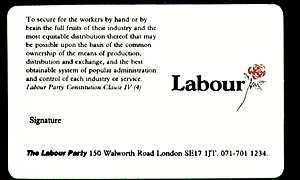 We all remember Tony Blair's audacious attack on his party's constitution back in 1995(see picture if you've forgotten); it enabled him to demonstrate that his rhetoric was not the empty mouthings of a 'Bambi' as his critics alleged, but the serious objectives of a serious politician. Poor Dave has had no such opportunity. His party has no much criticised constitution or even an organisational structure which applies a dead hand to progress- elements which Blair turned brilliantly to his own advantage. When members endorsed it, his bland policy statement which offended no-one(called 'Built to Last' or something similar I seem to recall)was nowhere near a sufficient test. But now one hoves into view: the tax cutting report from his policy commission led by the Thatcherite, Lord Forsyth(remember hating him? I do).
We all remember Tony Blair's audacious attack on his party's constitution back in 1995(see picture if you've forgotten); it enabled him to demonstrate that his rhetoric was not the empty mouthings of a 'Bambi' as his critics alleged, but the serious objectives of a serious politician. Poor Dave has had no such opportunity. His party has no much criticised constitution or even an organisational structure which applies a dead hand to progress- elements which Blair turned brilliantly to his own advantage. When members endorsed it, his bland policy statement which offended no-one(called 'Built to Last' or something similar I seem to recall)was nowhere near a sufficient test. But now one hoves into view: the tax cutting report from his policy commission led by the Thatcherite, Lord Forsyth(remember hating him? I do).This commission's recommendations were leaked yesterday; they comprise proposals that cuts worth £21 billion should be made including a 2p cut off the standard rate of income tax, abolition of inheritance tax and the 10 per cent tax rate and various cuts of business taxes. George Osborne did his best to spin the report into a mere 'menu of options'. He also sought to suggest such cuts(could be bad) will be off-set by green taxes(must be good) though Forsyth's report, it seems, does not mention any such a thing. The Deputy Director of the Institute for Fiscal Studies, usually sympathetic to Conservative economic policy, commented that, 'It's quite clear that these proposals would benefit the rich.'
So, there we have it. I'm not the only left of centre blogger to sense a moment of truth for Cameron here. At his conference he made it absolutely clear that there would be no tax cuts until they could be afforded and 'stability' preserved. Now an influential body- commissioned by no less a person than himself- has come up with the very proposals upon which he pronounced anathema. Now Dave, is the time to show your metal, to unhorse those hoary old knights of the 'Nasty Party', to slay your dragons and convince us your 'Compassionate Conservatism' is more than just the usual old Tory sleight of hand, or, as we often say up here, 'load of bollocks'.
Wednesday, October 18, 2006
Baker Report Presages one Heck of a Defeat for Bush and Blair
 James Baker III, aged 76, is one of the most distinguished and experienced of the US Republican 'grandees', having served as Chief of Staff to the White House(81-85) Treasury Secretary(85-89) and finally Secretary of State to Bush senior (89-92). In March this year he was appointed co-chair of the Congressional Iraq Study Group with the blessing of the president. Since a month ago reports have been circulating that Baker's visit to the front line has prompted a report which tells Bush his Iraq policy has been a disastrous failure.
James Baker III, aged 76, is one of the most distinguished and experienced of the US Republican 'grandees', having served as Chief of Staff to the White House(81-85) Treasury Secretary(85-89) and finally Secretary of State to Bush senior (89-92). In March this year he was appointed co-chair of the Congressional Iraq Study Group with the blessing of the president. Since a month ago reports have been circulating that Baker's visit to the front line has prompted a report which tells Bush his Iraq policy has been a disastrous failure. Today in his Guardian column Simon Jenkins witheringly deconstructs the implications of what has been leaked about the report, summed up by the sentence: 'The Vietnam moment is at hand'. The scale of the killing in Iraq is completely out of control. With over 100 civilian deaths a day, an estimated two thirds of a million since 2003 plus over 3000 US servicemen killed, the time for an agonising reappraisal is clearly nigh. Baker was apparently shocked to his core by his visit to Iraq and some of the sights he had to witness. He now looks for a solution between struggling on and 'cutting and running'.
The solutions suggested, like a threeways partition and the possible involvement of Syria and Iran, have the smell of desperation about them; these two countries, after all, were demonised as part of Bush's 'axis of evil' only in January, 2002. I suspect it is the Vietnam ending which awaits-yes,'cutting and running'- the second salutary lesson within a generation for the world's only super power that brute force does not equate with real political power. Meanwhile, we now see how close to the money General Dannat was with his intervention and how feeble Blair's response has been, pretending that he and the general disagree on nothing. As Jenkins notes this resembles the attitude of 'a forgotten outpost in a crumbling Roman empire... [which] dare not respond as no new instructions have arrived from Rome.' Instead he insists on repeating that withdrawal would be 'craven surrender' and would endanger British security.
Tuesday, October 17, 2006
On Cooling the veil Row and the Manchester Blog Awards
 Today a judicious leader in The Guardian calls for restraint over the Muslim veil issue. Jack Straw is a canny politician but even he cannot have foreseen the consequences of his intervention a week ago on the subject of Muslim veils. While some senior politicos argued the veils should make no difference to a constituency MP, others, including Harriet Harmon, Tessa Jowell, and, most importantly, Gordon Brown, weighed in on Jack's side. But the flood gates were, it seems, just waiting to open. Yesterday it was the Conservatives' turn, with David Davis asserting that 'There is a growing feeling that the Muslim community is excessively sensitive to criticism' and that they were risking 'voluntary apartheid' if they insist on cutting themselves off from the rest of the national community.
Today a judicious leader in The Guardian calls for restraint over the Muslim veil issue. Jack Straw is a canny politician but even he cannot have foreseen the consequences of his intervention a week ago on the subject of Muslim veils. While some senior politicos argued the veils should make no difference to a constituency MP, others, including Harriet Harmon, Tessa Jowell, and, most importantly, Gordon Brown, weighed in on Jack's side. But the flood gates were, it seems, just waiting to open. Yesterday it was the Conservatives' turn, with David Davis asserting that 'There is a growing feeling that the Muslim community is excessively sensitive to criticism' and that they were risking 'voluntary apartheid' if they insist on cutting themselves off from the rest of the national community.I have to confess that I could see merit in some of these injunctions. It is a fact that the British have a strong sense of fair play and feel that while the Muslims dish out criticism of their host culture, they seem to react with paranoid hysteria when any is offered in return. Anne Widdecombe on Sunday BBC TV illustrated this by pointing out that while Muslims showed placards outside Westminster cathedral saying 'Islam will defeat Rome', the reverse message shown outside a mosque would have been condemned as dangerously inflammatory.
The teaching assistant in Dewsbury, suspended for wearing a niquab in the classroom took the dispute to a new level however. While it is clearly wrong to expect children to be taught by masked teachers, it was also highly insensitive of Phil Woolas, the communities and local government minister, for goodness sake, to say: 'She should be sacked.' As the Guardian comments: 'Talk which leaves Muslims feeling adrift from mainstream Britiain may encourage the very alienation it deplores. Politicians ...should choose their words carefully... or they will only fan the flames'. Well said- but British Muslims should heed this advice too.
Manchester Blog Awards Well, I enjoyed the readings from the personal blogs, especially the airport diaries, but was only slightly disappointed not to win the prize for the 'political blog' category at the awards ceremony held last night at Urbis. However, I have no complaints that the legendary Norm should win the accolade as, over the years, he has surely done more for blogging than Guido and Ian Dale put together. I was just delighted to be shortlisted in the top three, along with Norm and the excellent Blood and Treasure. Thanks once again to Kate Feld, of Manchizzle for organizing the event so cheerfully and efficiently.
Monday, October 16, 2006
Are the Troubles Really Over?
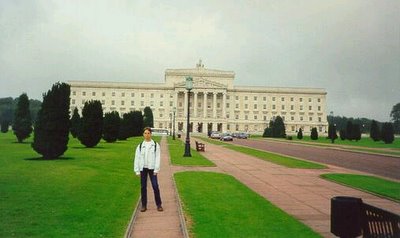 'My mission is to pacify Ireland' said Gladstone when told he was prime minister in 1868. Well, it's taken well over a century and still the Emerald Isle has not expunged the troubles created by centuries of British misrule. But maybe, as Peter Hain, secretary of state for the province, believes, the final piece of the peace process jigsaw has been inserted at the recent St Andrews' Agreement. If so perhaps the chronically legacy conscious Anthony Lynton Blair will be able to claim he's completed the task which the Liberal leader set himself 138 years ago.
'My mission is to pacify Ireland' said Gladstone when told he was prime minister in 1868. Well, it's taken well over a century and still the Emerald Isle has not expunged the troubles created by centuries of British misrule. But maybe, as Peter Hain, secretary of state for the province, believes, the final piece of the peace process jigsaw has been inserted at the recent St Andrews' Agreement. If so perhaps the chronically legacy conscious Anthony Lynton Blair will be able to claim he's completed the task which the Liberal leader set himself 138 years ago. The 1998 Good Friday Agreement(GFA) was a historic breakthrough but failed to include the fiercely suspicious DUP led by that veteran, gravel voiced curmudgeon, Dr Ian Paisley. He was convinced the IRA, under its official disguise of Sinn Fein, could not be trusted to govern until all its arms had been given up. On 15 October, 2002 the UUP collapsed the delicate Northern Ireland Executive(already suspended on threee previous occasions), then led by David Trimble, over the issue of alleged Sinn Fein spies within the fabric of government. No proof of the spy ring was ever forthcoming but since then but politics has moved on apace.
The second elections to the Northern Ireland assembly were scheduled for May 2003 but were delayed until November because of the deadlock over attitudes to the GFA.In these elections the DUP eclipsed the more moderate UUP as did Sinn Fein the moderate SDLP, squeezing the centre ground and making re-establishment of the Executive seem a mere aspiration. But then, maybe lured by the prospect of office, a thaw was discerned early this summer on both sides with the IRA recently announcing it has virtually disbanded itself.
The government then made a new initiative, threatening to wind up the Assembly if both sides refused to agree. It seems this well timed threat has borne fruit and agreement by the deadline of 10th November could see the Executive reincarnated on March 26th, 2007. There are still things to achieve-Sinn Fein have to accept the validity of the Police service of Northern Ireland-but if this can be achieved the extraordinary concept of(the pictured) Stormont Castle hosting the 80 year old Paisley as First Minister with Martin McGuiness as his Deputy will become a reality. Blair will then have deservedly placed a trophy in his legacy cupboard which has eluded every government since the end of the last century. The Guardian leader today warns that the agreement provides 'a blueprint... nothing more'; but if it really happens, then, up there, no doubt on God's right hand, the Grand Old Man is likely to be smiling.
Sunday, October 15, 2006
Dannatt's Risk Just Comes Off
 Sir Richard Dannatt's intervention in the field of politics was unprecedented and far reaching. He suggested the idea of installing a liberal democracy in Iraq as a means of encouraging reforms in the Middle East likely to make it more congenial to the west, was too ambitious and ought now to be redefined. He also, of course, suggested our unsuccessful presence had itself devolved into a reason for the present chaos, whereby, according to one disturbing calculation, one on 40 Iraqis have died since the war began. In addition the devout Christian commented on Islamic extremism in Britain and other matters as the Observer comments today. He was clearly 'out of order' in a country where the military are supposed to stay well clear of politics and merely do the bidding of the elected government. As Samuel Huntingdon defines this basic rule of western democratic government:
Sir Richard Dannatt's intervention in the field of politics was unprecedented and far reaching. He suggested the idea of installing a liberal democracy in Iraq as a means of encouraging reforms in the Middle East likely to make it more congenial to the west, was too ambitious and ought now to be redefined. He also, of course, suggested our unsuccessful presence had itself devolved into a reason for the present chaos, whereby, according to one disturbing calculation, one on 40 Iraqis have died since the war began. In addition the devout Christian commented on Islamic extremism in Britain and other matters as the Observer comments today. He was clearly 'out of order' in a country where the military are supposed to stay well clear of politics and merely do the bidding of the elected government. As Samuel Huntingdon defines this basic rule of western democratic government:'If the statesman decides upon war which the soldier knows can only lead to national catastrophe, then the soldier, after presenting his opinion, must fall in and make the best of a bad situation'
The alternative is to resign or be sacked. Some people, Mathew Parris, for example, on BBC television this morning, insist he should indeed have been sacked. Sir Richard airily suggests he had no idea his interview with the Mail's Sarah Hands would cause such a 'hoo-haa'. This is rubbish; as the Radio 4 profile on the soldier makes clear, this is one of the outstandingly clever military men of his day. He would never have thrown his knapsack full of political grenades into the later part of his interview without thinking through the consequences with the upmost care.
My view is that he took a calculated risk, as military men have to in the course of their profession. He feels strongly that Iraq is not a winnable conflict and needs to be either redefined or even abandoned. Afghanistan, on the other hand, he thinks is both justified and potentially winnable, given the redeployment of resources currently tied up in the Iraq theatre. His intervention was designed to defend his men by shifting this emphasis. It may have been unconstitutional, it may have opened up chasms both between the military and the political and UK and the USA, but it will have some kind of effect in the desired direction. Dannant knew he could be sacked, accepted the risk, and made his brave intervention. Almost certainly it was the current limpness of Blair's hold on the controls of government which both encouraged him to take the risk and enabled him to get away with it.
Saturday, October 14, 2006
Blair Too Disingenuous by Half

 For Blair to say he agrees with 'every word' General Dannatt has said and thatit is perfectly in line with government policy that 'Our strategy is to withdraw from Iraq when the job is done'- just won't wash. What the general said was in reality quite devastatingly different. First he said we should 'get our selves out sometime soon' later mentioning the time span of two years; and secondly that 'our presence exacerbates the security situation'. Neither statement is in accord with government policy and it is foolish, sub Campbell spin, to suggest otherwise.
For Blair to say he agrees with 'every word' General Dannatt has said and thatit is perfectly in line with government policy that 'Our strategy is to withdraw from Iraq when the job is done'- just won't wash. What the general said was in reality quite devastatingly different. First he said we should 'get our selves out sometime soon' later mentioning the time span of two years; and secondly that 'our presence exacerbates the security situation'. Neither statement is in accord with government policy and it is foolish, sub Campbell spin, to suggest otherwise. Evidence of this was provided by US reactions-no doubt surprised by this act of lese majesty by an allied general to his government- which refused explicitly to accept the validity of the word 'exacerbate'. That the general is right has not been disputed by most of our other military men as it merely expresses what they have been saying in private for some time. Iraq has effectively imploded into a condition virtually of civil war(picture on right shows the Reading Room of Basra University). In the chaotic internecine anarchy of Basra, as one officer is quoted as saying 'We are just another tribe' Dannatt thinks the war in Afghanistan is winnable and that tying up so many of our combat troops in Iraq lessens our chances of success in this other theatre. Given historical precedent, this is being optimistic I'd say, but the general's point about overstretching very limited and vital military resources must be correct.
But I wonder if his intervention will have done any good? I can't see Blair being swayed to depart from the Bush-Rumsfeld line by this troublesome officer though he might have influenced in some slight way, the long term planning of our presence in this benighted country. In the short term, however, by questionng the validity of our presence, he has arguably damaged the morale of his own troops striving valiantly to hold a line which threatens to break at any time.
Friday, October 13, 2006
Is Sir Humphrey still Hoodwinking his Ministers?
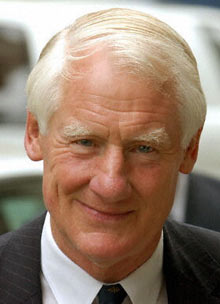 Students of British government have had a perrennial obsession with whether our permanent super-clever Oxbridge educated civil servants(like Lord Robin Butler pictured) regularly outflank their temporary ministers often of limited or inferior ability. The fact that 'Yes Minister'-a sit-com predicated precisely on this fraught relationship- had sold to so many countries worldwide suggests this is not merely a parochial national concern.
Students of British government have had a perrennial obsession with whether our permanent super-clever Oxbridge educated civil servants(like Lord Robin Butler pictured) regularly outflank their temporary ministers often of limited or inferior ability. The fact that 'Yes Minister'-a sit-com predicated precisely on this fraught relationship- had sold to so many countries worldwide suggests this is not merely a parochial national concern. David Blunkett's diaries today suggest that the very similar sounding complaints made by Crossman, Benn and Castle in their diaries have not gone away. At a Cabinet meeting in February 2002, Blunkett laid into the mandarins:
'We have a situation in my department where virtually anything of any importance is leaked. The Immigration and Nationality Directorate is a complete shambles. The only reason we got a police reform white paper and the reform of immigration, nationality and asylum was because the two respective advisers worked extremely closely with me on them ... The civil service are very lucky that we can't sack them, that no one can sack them" - with the implication that they damn well would be sacked if I had my way, and they would be. At the end of all this diatribe Tony said: "Well, I think Richard Wilson's got the message. You really love the civil service, David. You've got a lot of time for them and you believe they're doing a first-class job" - and everybody just doubled up.'
Yesterday Blunkett's diaries claimed civil servants often foiled intended action by submitting excessively long and 'obscurantist' briefing documents on such topics along with inflated costs they claimed the Treasury would never accept. It all sounds a bit- no, a lot- Sir Humnphreyish and one wonders if:
a) such complaints have a genuine basis in fact? Civil Servants, from my brief sojourn in it, only do such things when they feel their departmental interests are threatened.
b) Blunkett was a headstrong minister who they felt needed restraining on some issues? Not impossible I'd say.
c) Blunkett was indecisive and civil servants merely filled the vacuum- the usual situation when civil servants 'manage' their minister but this seems highly unlikely as well.
d) his blindness made it easier to pull the wool over his unseeing eyes. You decide, but he must have become used to countering this sort of thing.
Or maybe we do really have a civil service which feels so threatened by a Labour government- which side-steps established procedures and listens more to special political advisers than the established servants of the crown- that it wilfully imposes its own agenda where it thinks it can get away with it? Or is this just the standard whinging of politicians who fail to achieve their objectives and cast around for scapegoats?
Thursday, October 12, 2006
How Well do you know your Rukhnama?
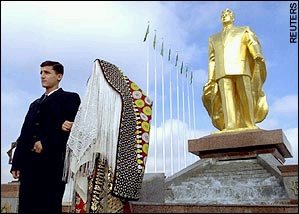
Back in November last year I posted that-whatever our moans about our political leaders- we should be very, very glad not to live in Turkmenistan, especially given the behaviour of its ruler, President Saparmurat Niyazov. An article in the Daily Telegraph given to me by a member of my current affairs class(thanks Selwyn) updates the story in a way which greatly reinforces my original point.
This residual Stalinist clone has already decorated his impoverished country with golden statues of himself(picture shows newly weds in front of one), has banned his citizens from wearing gold teeth or, because he found la Traviata immoral, listening to opera. But it is the Rukhnama, to which I would direct readers' attention, as this surely, indicates what a Himalayan size fruitcake old Niyazov really is.
This 400 page volume penned by Ni himself, is not just something, produced by the head of state, like Henry VIII's songs, as the product of a harmless hobby. No, this fearsome volume is meant to provide spiritual guidance to the nation. And it's by no means optional either. School teachers have been ordered to write articles in newspapers singing the praises of the president's prolix effusions. Desperate to avoid the sack or reduced pay(the penalties for failing to make it into print), teachers have been besieging newspaper offices with enthusiasm unequalled by any free-lancer over here.
But there's more and worse: teachers will soon also have to sit an examination to demonstrate their knowledge of said dubious philosophical tour de force which now already comprises most of the school syllabus.
'Even medical students must spend most of their time learning from it. The only other author they are allowed to read is the 11th century Persian physician, Avicenna.'
Turkmenistan is rich in oil and other mineral deposits but ordinary citizens live, for the most part, in abject poverty. Despite a ruler as mad as a March Hare, the US government sees him as 'Our Mad March Hare' and he regularly receives visits from their diplomats and military. And us lot in the EU? Well, we bestowed 'Most Favoured Nation' trading status on the regime last March. Shame on us. For more visual information see here
Wednesday, October 11, 2006
Should we bomb North Korea's Nuclear Facilities?

Simon Jenkins in his clearly argued article today, suggests now may be the time to act militarily against North Korea. He argues economic sanctions would be cowardly and likely to hurt only the starving citizens of the country rather than influence its leaders. Tomahawk missiles aimed at the nuclear facilities would do the trick nicely and: 'Fewer people would die that way than with any other pre-emptive response.'
Jenkins is a serious columnmist and one who advocates withdrawal from at least one other current foreign imbroglio. Would it make sense to replicate a Bush like pre-emptive strike to prevent a disturbed ruler from posibly running amok for example by making nukes available to terrorists? I can think of three reasons why this is not such a good idea:
a) Jenkins argues N.Korea is isolated and hence, one assumes, such enforcement could be completed with impunity. But we learn from David Usborne in the Indie today, that both Russia and China, though worried by their erstwhile puppet's behaviour, are not willing to contemplate the use of force. Both will oppose a critical resolution under Chapter 7 of the UN Charter which would enable it to be enforced militarily. While it could well be that both countries would fall in line once the deed was done, alienating such major powers would not be advisable.
b) Should the action be successful, it would encourage Pentagon hawks to urge similar treatment for Iran, a measure which would further inflame Muslim opinion and exacerbate the socalled War on Terror.
c) Condoleeza Rice has anyway, already stepped back from such a measure: 'The USA doesn't have any intention to attack North Korea or invade.' After such an unequivocal statement it would be hard to over-rule it.
So, it seems that rather than 'bomb it now', as the latter part of Jenkins' title proposes, we will probably have to follow his former option and 'accept North Korea into the nuclear club'. It will be dangerous but maybe less so than raining destruction on yet another poor country; besides, if India and a less than wholly stable Pakistan have been granted de facto acceptance, why not one more?
Tuesday, October 10, 2006
Hard for Members of Nuclear Club to Urge Non- Proliferation
 When I studied International Politics at university I did a course on disarmament; all those interwar conferences trying vainly to make a distinction between aggressive and defensive weapons. They didn't work. Later, I was never very clear as to what our 'Disarmament Minister', Lord Chalfont, ever achieved in the sixties. Yet we have subsequently had agreements between states which have achieved a modicum of success. There was the Nonproliferation Treaty of 1966 and then the Intermediate-Range Nuclear Forces Treaty of 1987. But since then things have deteriorated, as Dan Plesch notes and life has become much more dangerous.
When I studied International Politics at university I did a course on disarmament; all those interwar conferences trying vainly to make a distinction between aggressive and defensive weapons. They didn't work. Later, I was never very clear as to what our 'Disarmament Minister', Lord Chalfont, ever achieved in the sixties. Yet we have subsequently had agreements between states which have achieved a modicum of success. There was the Nonproliferation Treaty of 1966 and then the Intermediate-Range Nuclear Forces Treaty of 1987. But since then things have deteriorated, as Dan Plesch notes and life has become much more dangerous.Now the nuclear powers are, in descending order of firepower: USA, Russia, China, UK, France, Israel, India, Pakistan, and, since the recent underground test, North Korea(though some scientists in the west question if it really was a genuine test). There can be no doubt that the acquisition on nukes by this 'secretive and atrophied Stalinist relic' as the Guardian's leader describes it, makes the world's survival more parlous. What should we do? As Plesch points out we have rather tied our hands by not wishing to prejudice our chances of acquiring upgraded Trident missiles from the US. So we are fated to support the line set by George Bush, who inspires only a little more confidence than the bouffant haired Kim Jong-il.
How this problem is countered will be complex and delicate and I was not reassured by US Ambassador to the UN, John Bolton's bullish performance on Today this morning- though I was impressed by his powers of argument, which clearly vastly exceed those of his president. With such attitudes from the world's only superpower, the UN's chances of coping seem small and one can only pray that pre-emptive attack is not embraced by the White House as the only course of action. Nor was I impressed by Margaret Beckett's performance on Today yesterday. Humphries asked her how we in Britain could justify urging non nuclear nations to retain this status when we had no intention of giving up our own stockpiles. She fumbled before showing her lack of calibre by resorting to waffle but, alas, there is no satisfactory answer to that question.
Monday, October 09, 2006
Why Can't we Recycle More Waste?
 Jackie Ashley is right to focus on the topic of waste disposal in today's Guardian. Such topics are often regarded with the ennui with which many reserve for local politics, but if we are honest, we all care about the issue and recognize its importance. The green arguments in favour of recycling do not need repeating but it always strikes me as pathetic that while countries like Austria, Germany, Holland and Belgium can recycle over half of their waste, we can manage only a measly 23 per cent.
Jackie Ashley is right to focus on the topic of waste disposal in today's Guardian. Such topics are often regarded with the ennui with which many reserve for local politics, but if we are honest, we all care about the issue and recognize its importance. The green arguments in favour of recycling do not need repeating but it always strikes me as pathetic that while countries like Austria, Germany, Holland and Belgium can recycle over half of their waste, we can manage only a measly 23 per cent. An EU directive-essentially with statutory effect- states landfill sites must not be used so prodigally; within 15 years only one third of our waste can be so disposed. So, as in so many respects regarding the environment, we have to change our ways. In Stockport we now have black plastic bins for the purpose-collected fortnightly- but only for bottles and tins; I have to drive to the local tip to recycle other materials like cardboard and plastics. Ireland introduced a tax on plastic bags- only a small tax- and it has led to a 90 per cent reduction in usage with consequent benefits for the environment. Ashley says Michael Meacher was about to introduce the same scheme in the UK but was prevented by being reshuffled out of government. Why on earth cannot wunderkind David Miliband introduce a measure which is both easy, necessary and proven to work?
German Rubbish Disposal Practice
Everyone knows the Germans are 'relentlessly efficient', but that often pejorative stereotype should not prevent us from admiring the good things they do. My sister lives in a small village in Bavaria and tells me she has separate bins for recycling paper, glass, tins, cardboard, plastic and various species of wrapping. These are then regularly taken to recycle depots in each village where volunteers assist with loading into the respective skips and bins. In addition they have 'compost' bins for biodegradable material-food and the like- which are collected fortnightly in winter and weekly in summer. This helps explain why such a commendably high percentage of waste is recycled in Deutchland.
But, I hear you object, Brits are not like our beach colonizing Teutonic cousins; we would never take the trouble to sort out so many different items. Well, in Germany the incentive is financial; the more you recycle, the less you pay for the rubbish which is collected. Each household chooses a size of bin- small, medium ahnd large-and pay different annual fees for each size; the average family of four pay about £100 a year for rubbish collection. If you overfill your bin, it will be refused- and we all know how corporation operatives over here would love doing that. If it hit our pockets, as in Germany, we would, I suspect, soon change our habits to the advantage of the environment. Why on earth are we so slow to adopt best practice?
Sunday, October 08, 2006
Woodward spills the Beans on Iraq
 The hero of Watergate has been a little quiet of late but his latest book, Plan of Attack, has ended all that. In it- based on scores of interviews with top people including Bush- he lifts the lid on what actually happened over the decision to attack Iraq. This morning on Andrew Marr's programme he shared some of the choicest morsels with British viewers. It seems that as early as five days after 9-11, Bush was 'determined to do something about Saddam Hussein.' Egged on by Rumsfeld and Cheney- who according to Powell had a 'fever' on the subject- he ordered General Tommy Franks to prepare a plan of attack. Powell was opposed throughout according to the account on the CBS site, but, once the CIA told Bush they could not overthrow Saddam, was ordered by his president to put on his 'war uniform'. About this time in early 2003 the Saudi foreign minister was informed of the plan- Woodward confirmed to Marr that Blair was also informed at this time- yet more evidence of Blair's duplicity many of us had assumed at the time. He also said that, as a result of this disagreement, Powell did not speak to his eventual successor, Condi Rice, for some time.
The hero of Watergate has been a little quiet of late but his latest book, Plan of Attack, has ended all that. In it- based on scores of interviews with top people including Bush- he lifts the lid on what actually happened over the decision to attack Iraq. This morning on Andrew Marr's programme he shared some of the choicest morsels with British viewers. It seems that as early as five days after 9-11, Bush was 'determined to do something about Saddam Hussein.' Egged on by Rumsfeld and Cheney- who according to Powell had a 'fever' on the subject- he ordered General Tommy Franks to prepare a plan of attack. Powell was opposed throughout according to the account on the CBS site, but, once the CIA told Bush they could not overthrow Saddam, was ordered by his president to put on his 'war uniform'. About this time in early 2003 the Saudi foreign minister was informed of the plan- Woodward confirmed to Marr that Blair was also informed at this time- yet more evidence of Blair's duplicity many of us had assumed at the time. He also said that, as a result of this disagreement, Powell did not speak to his eventual successor, Condi Rice, for some time. But, despite all warnings, the die was cast: the bombs dropped, the tanks rolled and things have got so bad now, according to Woodward, that an attack is made in Iraq by insurgents once every 15 minutes. More and more it resembles the shambles in Vietnam and it cannot be long before scuttling strategies are investigated. We perhaps read of onesuch in the Sunday Times today. A Congressional study group, set up with presidential approval and led by former Secretary of State James Baker, may very well recommend that Iraq be divided up into three autonomous units recognising the de facto power bases already fighting what is effectively a civil war: the Kurds, the Shias and the Sunnis. This seems like a possible sword to cut the Gordian Knot of Iraq, especially as 'ethnic cleansing' is already well advanced in Bagdhad, but the danger is that it might make things even worse. Consider:
i) wouldn't a Kurdish state lead to demands for inclusion of 'nationals' from Turkey and Iran, triggering a potentially catastrophic regional conflict?
ii) wouldn't the Sunnis refuse to be locked out of the oil which mostly lies in Shia areas?
iii) how would the 'mixed' urban settlements of Iraq's major cities be resolved?
iv)is there not a danger of groups-for example redidual Ba-athists- fighting for the maintenance of a unified state?
Indeed, so disastrously mismanaged has the intervention been that it may well be too late for western action to have any significant effect whatsoever. As Anthony Cordesman of the Centre of Strategic and International Studies, is quoted as saying: 'The internal politics of Iraq have taken on a momentum of their own.' Meanwhile I read in the Sunday Telegraph that an ICM poll reveals over half of British people want withdrawals from Iraq within a year and Afghanistan by the end of this year.
Saturday, October 07, 2006
Straw's Request on Veil Legitimate

 Jack Straw's initiative on Muslim veils can be viewed from a number of perspectives:
Jack Straw's initiative on Muslim veils can be viewed from a number of perspectives:1. It was a bid for Middle England credibility with a view to his candidature for his party's Deputy Leadership. Several commentators discount this as not Jack's style, but the same observers tell us Jack seldom does or says anything without exhaustive planning and consideration. As with all politicians at this level, he is unlikely to have discounted the possible good his article in the Lancashire Telegraph might do for his career.
2. He is merely making a personal point. At one level this must be the case. He states a preference for Muslim women, who come to see him, not to wear the veil as it impedes effective communication. He does not state this as a condition of seeing them and he couches his request in the mildest and most polite of terms. Few would be deterred, should they wish it, from wearing the veil by such a mild mannered man. With over a quarter of Muslims in his Blackburn constituency, he would have been foolish to express himself in any other way; and his popularity with them was evidenced by his only slightly reduced majority in May 2005 despite the best efforts of the Muslim Public Affairs Committee UK to play on his close involvement with the war in Iraq. Given all these considerations such a motive is clearly legitimate in my view.Those who say he wouldn't ask orthodox Jews to eschew their yarmulkes or black attire miss the point; such things do not impede face to face communication.
3. He is also making, at least implicitly, a wider point about integration and separation of cultures. It is this third possibility which has excited criticism, some of which, a Martin Kettle points out, has sounded far less reasonable than Straw's own measured tone. This is a delicate matter, of course. Incoming cultures are entitled to retain their autonomy but they are also expected, as in the USA and many other countries, to make efforts to assimilate, to fit in. This means, at minimum it seems to me, making an effort to learn the language, acquiring some familiarity with the institutions and procedures of their new hosts as well as respecting their laws. I would never support a prescriptive approach on the wearing of veils(though we learn, incidentally from Kettle, that the Qur'an does not require a woman to wear the full veil), but if it was a question merely of desirability, I'd prefer this barrier to communication and understanding not to be there.
Friday, October 06, 2006
Could NHS prove to be Labour's Achilles Heel?
 Michael Portillo, on This Week last night defended Dave's foray into Labour's traditional territory of the NHS on the grounds that if Labour always led on this topic then a frontal charge at their cannons was at least worth the effort. Even a brief examiniation of recent polls, however, reveals that the situation is much more depressing than for the government party. Last May polls showed that:
Michael Portillo, on This Week last night defended Dave's foray into Labour's traditional territory of the NHS on the grounds that if Labour always led on this topic then a frontal charge at their cannons was at least worth the effort. Even a brief examiniation of recent polls, however, reveals that the situation is much more depressing than for the government party. Last May polls showed that:'Despite massive increases in spending and staff numbers since 1997, the Tories now lead Labour by two points as the party with the best policy on the NHS. That compares with a 14-point Labour lead when Britain went to the polls last year.'
Indeed, the economy was the only major policy sphere at that time to register a Labour lead, and even that a reduced one. More recent polls confirm a trend which could prove fatal to Labour, given that Cameron has apparently chosen the NHS as his main battle-ground. Cameron's bold move is supported by poll evidence and the poor book-keeping which has caused well publicised cuts has exacerbated the situation. The campaign to save Bedford hospital might even produce a repeat in 2009 of the 2001 Wyre Forest upset when Dr Richard Taylor stood for the Commons on saving a local hospital and defeated a Labour junior minister.
Most users of the NHS which I have encountered are sure that it has improved greatly since 1997 but the public image-informed by hostile press coverage- has not reflected this. For instance- a very personal example- in 1992 when I suffered a major turning point in my life- a stroke while jogging- I slept that night in a corridor(no, not the one in the picture); last year when I had a minor operation to remove a cyst, I was in and out within a day and within a month of my GP's referral. Solving this problem for Labour will not be easy as the Guardian comments today.
But the Conservatives' antidote- while apparently popular- is nowhere to be seen; so far they have exploited current popularity and added their own, 'Dave's family' spin. One small ray of hope for the government might be Labour's perennial port in a storm, Oliver Letwin, the Conservative head of policy development. According to the lastSunday Times, he has indicated his party is 'gung ho' on privatising this sacred national monument(specifically, he said that under a Conservative government, there would be 'no limits' to the use of private provision). If Labour can exploit that admission it might have a chance of regaining the initiative on this, it's traditionally strongest issue.
Thursday, October 05, 2006
A Good Week for Tony at Bournemouth Conference
 Well, it was a very average week for the Tories in Bournemouth in the end but a good one for Tony Blair it would seem. According to Michael White, 'At times New Toryism sounds dangerously like Blairism minus Blair'. Will Woodward, furthermore, reports a debateon international aid where guest apeakers praised Blair and the achievements of his government; surely that wasn't in the party managers' script? And finally, Dave himself 'spoke movingly about a young idealistic leader of 12 years ago, wanting to change his party, wanting to change the country.' Who was he talking about? Tony Blair of course.
Well, it was a very average week for the Tories in Bournemouth in the end but a good one for Tony Blair it would seem. According to Michael White, 'At times New Toryism sounds dangerously like Blairism minus Blair'. Will Woodward, furthermore, reports a debateon international aid where guest apeakers praised Blair and the achievements of his government; surely that wasn't in the party managers' script? And finally, Dave himself 'spoke movingly about a young idealistic leader of 12 years ago, wanting to change his party, wanting to change the country.' Who was he talking about? Tony Blair of course.Perhaps more worrying for the Tories was the Yougov poll of two days ago where Tony King explained why 'The Tories don't lead Labour by 15 Points' as perhaps they should at this point in the electoral cycle. It seems, that while the majority like Dave, most people are still unclear what a Cameron government would be like and nearly as many don't trust them to 'run public services'. Even more tellingly, Yougov asks respondents to place themselves and politicians on a Left-Right scale.
In 2004 Howard and his party were far right of centre. 'Now they still place the Conservative party as a whole far to the right but with Cameron considerably closer to the centre. By contrast both Blair, Brown and Labour as well as the Lib Dems are far closer to the centre of political gravity. What's the big deal? Well, 'two thirds of voters place themselves either in the political centre or very close to it... [this] is almost certainly where the next general election is going to be fought and won.' It'll be interesting to see whether the Tories' get a conference 'bounce' and whether it is big enough to shift them off the present plateau of some 38 points-too low to win an election- on which they seem stuck.
Wednesday, October 04, 2006
Dave's big Speech Fails to Impress
 Well, I didn't think much of the boy king's speech, did you? As a left of centre person I welcomed the messages on the NHS- no reprise of the eighties atrophy threatened; liberal on gay themes- anything which makes Norman Tebbitt grind his teeth is good by me; and the distancing from America-now that really will win some votes that would otherwise go to the Lib Dems.
Well, I didn't think much of the boy king's speech, did you? As a left of centre person I welcomed the messages on the NHS- no reprise of the eighties atrophy threatened; liberal on gay themes- anything which makes Norman Tebbitt grind his teeth is good by me; and the distancing from America-now that really will win some votes that would otherwise go to the Lib Dems. But, given he clearly idolizes Tony Blair- look at his image, his style, his studied vacuity - and even the pinching of TB's soundbite on 'tough on crime.. etc', I thought his speech was to a Blair speech as Shrewsbury Town(my home team) is to Manchester United. Clearly his party handlers needed a few of those cheerleaders who were so very (hyper)active at the end of IDS's speech back in 2004. You'll have to do better than that Dave to move into the Premiership.
Tuesday, October 03, 2006
Cameron's Woes Multiply
 Oh Dear, I wonder if the wheels are not ever so slightly coming off Dave's wagon at Bournemouth? Maybe soon it'll resemble the shambles we all used to know and love under its former leaders(see cartoon). Since I wrote my post on the 'mountain' he had to climb two days ago, that summit seems to have ascended appreciably.
Oh Dear, I wonder if the wheels are not ever so slightly coming off Dave's wagon at Bournemouth? Maybe soon it'll resemble the shambles we all used to know and love under its former leaders(see cartoon). Since I wrote my post on the 'mountain' he had to climb two days ago, that summit seems to have ascended appreciably. 1. It was Higher Anyway: for this point I'm indebted to Cassilis's comment on yesterday's post in which he points out that while Blair had to overturn the accumulated weight of a century's history, Cameron merely has to make an adjustment, to tack back to a liberal tradition which was only interupted by Thatcher just three decades ago.
2. Party Funding I: we learn today that Scotland Yard detectives will interview all 13 of those who lent £16m to the party before the last election. So far the scandal has only lapped at the feet of Labour officials and politicians; now a wave appears to have engulfed the Tories too.
3. Party Funding II: We learn from the same article that, as well as Inspector Knacker investigating, the Electoral Commission will look into those shady organizations feeding cash into the Tory Party. They used to have a number of 'front' bodies which did this and stoutly opposed any transparency. Now the Constituency Campaigning Services and the Midlands Industrial Council, which feed funds into marginal constituencies, are being checked out. The Conservatives seem divided over whether these bodies are part of their movement or not: Conservative HQ says they are not; Cameron says they are; Hague says they are both. So that's cleared up then.
4. Fringe/MPs Revolt over Tax Cuts: We learn also that up to a half of Conservative MPs want an up front commitment to tax cuts instead of the Osborne 'stability first' approach. Edward Leigh, influential chair of the Public Accounts Committee, warned that the party is one of 'lower taxes or it is nothing'. John Redwood's pamphlet of yesterday weighs in on this side, not to mention that hoary old warhorse, Norman Tebbitt, raucously acclaimed for the same message at a fringe meeting.
5. Green Air Flights Plan DefeatedActivists defeated the new command's assertion that cheap flights are a 'false economy' by 57 per cent to 43, despite a procession of environmentally sound advisers arguing in favour.
Come back Hague, IDS and Howard, all is forgiven?
Monday, October 02, 2006
Core Conservatives Don't Accept Cameron in their Hearts

 Two articles in my daily newsheet today illustrate the extraordinary fluidity of current politics and the strangeness of the times we live in. Max Hastings asserts 'Cameron knows that Britain is a social democratic country. Only a catastrophe will make it anything else in the foreseeable future.' Max reflects that some elements in Dave's party refuse to fall in line, mentioning the frothing Tebbit, Simon Heffer, Charles Moore and John Redwood who 'has broken away from the the kindly attendants in white coats who accompany him through public life.' These elements he sees as 'baying for raw meat, blood on the carpet, gibbets at Westminster'.
Two articles in my daily newsheet today illustrate the extraordinary fluidity of current politics and the strangeness of the times we live in. Max Hastings asserts 'Cameron knows that Britain is a social democratic country. Only a catastrophe will make it anything else in the foreseeable future.' Max reflects that some elements in Dave's party refuse to fall in line, mentioning the frothing Tebbit, Simon Heffer, Charles Moore and John Redwood who 'has broken away from the the kindly attendants in white coats who accompany him through public life.' These elements he sees as 'baying for raw meat, blood on the carpet, gibbets at Westminster'. Hastings thinks Cameron's current struggle with his party will be 'decisive for his own future, warning that if he allows himself to be turned by, for example, the No Turning Back Group, 'he will merely become the Tories' fourth losing leader in a row.' Dave will no doubt have this in mind when he deals with those importunate elements in his own party who yearn for tax cuts and a return to Thatcherite certainties.
Meanwhile Jackie Ashley, observes 'Labour pitching its appeal to the centre right' with overtones of 'new immigration controls and an even tougher crackdown on terrorists, hoodies and the workshy.' Strange times indeed. But it is worth reflecting that 'New Labour', a project conceived and created in the latter period of Neil Kinnock's reign, has never really won the heart of party members; rather it has been adopted as an expedient to win back power in the hope that it doesn't really mean what it appears to say.
Blair used to reply to criticism of his proposed New Labour reforms with the words, 'It's even worse than they think, I actually believe in all this'. I suspect the Conservative core vote, still sceptical and still fundamentally 'nasty', will do something similar with Cameron. He seems to be an election winner and as such deserves some standing ovations; but has he won their hearts? Or will he ever? I don't think so.
Sunday, October 01, 2006
Don't Kid yourself Dave- you still have a Mountain to Climb
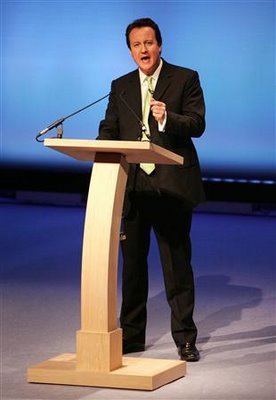 I watched David Cameron being grilled by Andrew Marr this morning and was impressed by how he has grown into his leadership role in the nine months since he was elected. He seems to have gripped the party machine and routed his opponents on the right like Tebbit, Melanie Philips and the Daily Telegraph. Andrew Rawnsley today suggests Labour's failure to resolve its leadership impasse at Manchester leaves the field clear for the Etonian to excell this coming week at Bournemouth. Michael Portillo, seems to agree, suggest he has only to make a passable speech, sit tight and let Labour's infighting continue its self destruction. But these judgement should not lead one to assume it will be easy, either to emerge with a triumph this week or to open the door to 10 Downing St.
I watched David Cameron being grilled by Andrew Marr this morning and was impressed by how he has grown into his leadership role in the nine months since he was elected. He seems to have gripped the party machine and routed his opponents on the right like Tebbit, Melanie Philips and the Daily Telegraph. Andrew Rawnsley today suggests Labour's failure to resolve its leadership impasse at Manchester leaves the field clear for the Etonian to excell this coming week at Bournemouth. Michael Portillo, seems to agree, suggest he has only to make a passable speech, sit tight and let Labour's infighting continue its self destruction. But these judgement should not lead one to assume it will be easy, either to emerge with a triumph this week or to open the door to 10 Downing St. 1. Writing yesterday Martin Kettle summoned up Karl Rove's assessment of the questions voters ask at election times: Is he a strong leader? Can I trust him? Does he care about people like me? Kettle concluded that:
a) Cameron has won his inner party battles but there have been no really big ones- like Blair's Clause Four victory over Labour's institutional opposition-to prove the point conclusively.
b) Cameron appears trustworthy but so did Blair at first; it would only need public revelation of involvement in, say, suppressing evidence connected with the peers for loans affair, for all the public's prejudices about politicians to crowd in and sully his trustworthiness in a trice.
c) Cameron has little need to convince Middle England that he cares about people like them- but the north and other peripheral areas? Doubtful. And Cameron's silver spoon provenance will be exploited by Labour, especially when his closest side-kick and soul-mate in politics is posh St Paul's educated George Osborne, profiled yesterday on radio four. Kettle concludes the questions in Dave's case would be answered respectively with: 'don't know, perhaps and maybe' while for Brown they would be probably be: 'yes, not sure and probably'.
2. It has been fine for Dave to brush aside calls for policy detail with the point that he is intent still on changing his party. True, but soon his policy teams are going to report and there could be problems with some of them in very quick time. For example the man heading his policy review, Oliver Letwin, has said there will be 'no limit' to the privatising of the NHS under a Conservative government. Ever since 1948 when the service was founded it has been seen as the ark of the welfare state's covenant and any reform has required extreme political delicacy. Similar things will happen when other groups come up with proposals for tax cuts.
3. Brown may be boring, Scottish and relentless, but he is no slouch politically and could well inflict considerable damage on the still inexperienced Cameron and his public school cronies.
4. Even though the government has had an appalling summer characterized by scandals(Prezza and loans for peerages)and bloody political infighting not to mention ongoing tragedies in Iraq and Afghanistan, Labour, no doubt helped by its conference 'bounce' can still manage to be level pegging with the Conservatives in the polls, according to yesterday's Telegraph.



